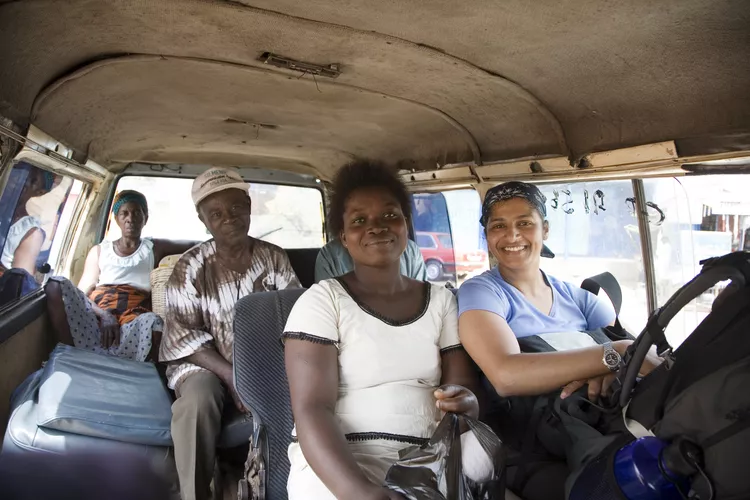1. Introduction to Tro-Tros in Ghana
The name “tro-tro” originates from the old Ga word meaning three pence, which was the fare during British rule in Ghana. Historically, these public transport vehicles were converted Bedford trucks that facilitated transportation for passengers seated on wooden benches.
2. Understanding Tro-Tros Today
Today, ‘tro-tro’ is a broad term used for any privately owned public transport vehicle in Ghana. The typical vehicles include small Nissan buses, mini-vans, and converted pickup trucks. Despite the changes in currency, tro-tros remain an incredibly affordable travel option, costing just a few pesewas. However, since there is no set schedule or route map for these vehicles, it’s essential to follow some guidelines to navigate this colorful mode of transport.
3. Finding a Tro-Tro
Tro-tros operate on fixed routes in cities, making them easy to locate along major roads. You can always ask locals on the street for directions to the nearest tro-tro stop. For long distance travel, head to a tro-tro station where enthusiastic touts will guide you to vehicles heading to various destinations. Additionally, you may flag down a tro-tro along the main road, using hand signals, such as raising your finger indicates a ride to the next major town while pointing down signifies a local tro-tro making frequent stops.
4. Knowing Which Tro-Tro to Board
While tro-tros have definite routes, there are no written schedules available. Most locals are knowledgeable about the various services, so don’t hesitate to ask for assistance. In urban areas like Accra, tro-tros will announce destinations loudly, such as “Accra! Accra! Accra!” or “Circle!” for the main bus station. For those traveling to the university, listen for “Legon!” If embarking on a journey out of town, visit the tro-tro depot and inquire about the appropriate express service.
5. Tro-Tro Departure Times
Tro-tros typically depart only when full. In larger cities like Accra or Kumasi, you won’t have to wait long. Conversely, if you opt for long-distance tro-tros, prepare to endure a hot and cramped wait until enough passengers board. Aim to board a tro-tro that is already packed, as this can shorten your wait time. In remote areas, departures may be limited to the morning, so verify timings a day prior, as Sundays often see fewer tro-tros unless it’s a market day.
6. Paying Your Fare
In most urban centers, fare payment is made to the tro-tro “mate,” who manages the cash and announces the destination. For longer distances, you typically purchase a ticket from a Private Transport Union booth. The cost of traveling by tro-tro is quite low; expect to pay around five cedis or less for every 100 kilometers. Within cities, fares are often between 20 to 50 pesewas, so it’s advisable to carry small change. If you offer a 10 Cedi note, be prepared for potential complaints.
7. The Tro-Tro Experience
A tro-tro is a space where personal space might be limited. Though everyone is guaranteed a seat, many tro-tros are modified for additional seating, leading to closer proximity among passengers. In bustling cities, you will find yourself seated among well-dressed commuters and students in relative quiet. During longer rides, hawkers will often pass by selling refreshing drinks and snacks to keep you satisfied.
8. Food and Drink Options
Street vendors are ubiquitous in Ghana, found at traffic lights and tro-tro stops, offering a range of street foods and goods. Fellow passengers often assist in purchasing snacks such as peanuts, water, and doughnuts. Securing a window seat provides a better view of the offerings outside. Once seated, getting up during stops is uncommon; if you wish to stretch your legs, choose a seat that facilitates your exit when others disembark.
9. Tro-Tro Safety Considerations
Ghana’s road conditions vary, and drivers often work long hours, resulting in a high rate of accidents. While tro-tro accidents do occur, the experience is still deemed essential for visitors to Ghana. Nevertheless, if safety is a concern for long journeys, seek out alternative transportation methods like buses or taxis. Regardless, ensure the tro-tro experience remains part of your Ghanaian adventure.
Top Tip: Due to space constraints, your luggage will likely ride on the roof. Familiarize yourself with your bag’s placement and ensure it is securely tied down. Consider using waterproof covers for added protection against theft or falling out.




